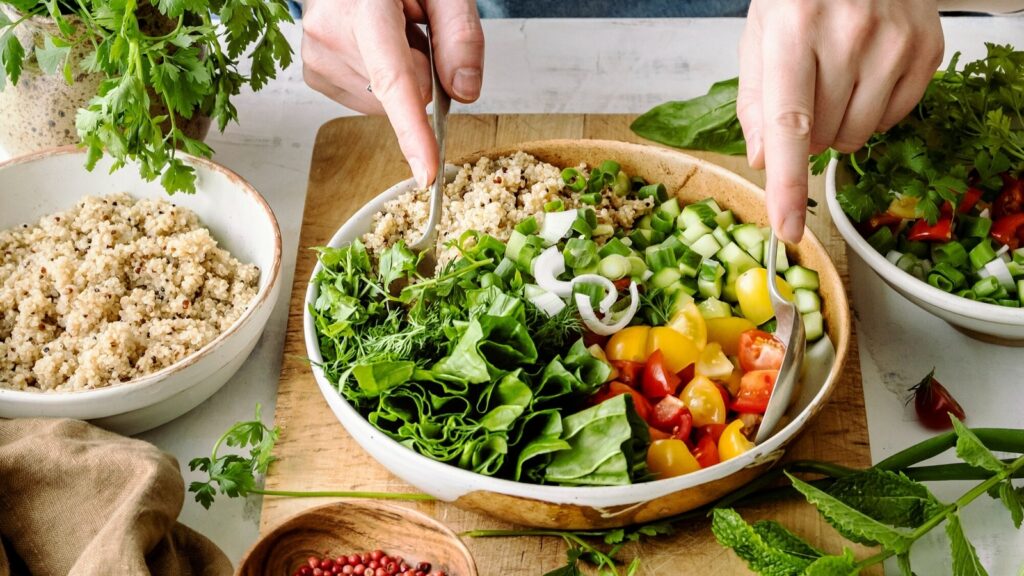Vegan diets tend to be high in fibre and low in saturated fat; but are they effective for weight loss? Both vegan and vegetarian diets can potentially improve heart health; but which diet has a slight edge? And when it comes to fatty liver disease, which is the best diet for you – vegetarian or vegan? Also read | How to lose weight with South Indian diet, according to fitness coach: ‘Avoid idli and dosa, switch to low calorie…’
Pratyaksha Bhardwaj, a weight management expert and director of Shree Skin Care and Slimming Centre, Jagadhri, Haryana, in an interview with HT Lifestyle, answered these questions and much more.
He said, “India, a country where the relationship between food, culture, religion, and tradition is so close and strong, has been consuming only plant-based foods for centuries, a practice known as vegetarianism. However, the even more restrictive vegan diet has recently gained acceptance among health-conscious Indian people. Additionally, both vegetarianism and veganism are rich in nutrients and highly accessible. However, when it comes to losing weight and managing heart disease or liver disease, balance, planning, and sustainability become the decisive factors.”
Vegan vs vegetarian: what is the difference?
Pratyaksha explained, “The common diet for a vegetarian includes fruits and vegetables as well as pulses, cereals, nuts, and oilseeds, apart from dairy products such as milk, curd, and paneer. This is indeed the way to obtain a wider range of nutrients, including the intake of good-quality protein and calcium from dairy.”
“On the contrary, a vegan diet eliminates all animal-derived products. Basically, vegans rely on plant sources for their proteins and fats, and these happen to be tofu, legumes, soy milk, and seeds, among others. It can be quite healthy, but careful supplementation with vitamin B12, calcium, and omega-3 fatty acids — nutrients mainly found in animal products — is necessary,” he added.
Is vegan diet more effective for weight loss?
Pratyaksha shared that several studies, one of which is the recent one in The Journal of General Internal Medicine (2024), found that vegan dieters tend to lose a bit more weight than those on vegetarian or mixed diets. And the reason? “Vegan diets are mainly comprised of low-saturated-fat foods and high in fibre, which not only makes one feel full but also helps in easier food passage through the digestive system,” he said.
“On the contrary, a typical Indian vegetarian meal consisting of lentils, seasonal vegetables, chapati, and curd in proper proportions can also result in steady and sustainable weight loss, provided that calorie intake and portion sizes are monitored. One such change, for example, replacing ghee with olive oil, using curd with a lower fat content, and increasing the use of whole grains, would result in the vegetarian diet achieving the same amount of fat loss as the vegan one,” Pratyaksha said.

For heart health, which is the best diet?
“Heart disease is still the major cause of death in India, and one of the main preventive measures is changing one’s diet. The vegan and vegetarian diets can drastically reduce LDL (‘bad’) cholesterol, and at the same time, they improve heart and blood vessel functioning because they are composed of high fibre and low saturated fat,” Pratyaksha said.
He added, “That being said, the heart health of vegans is usually somewhat better compared to vegetarians since they do not consume any dairy fats. However, milk products like curd and paneer can also be heart-healthy when consumed in moderation, as they help maintain proper gut flora and decrease inflammation, thereby positively affecting the heart.”
Pratyaksha added that a ‘flexi-vegan’ scheme can be a feasible option for Indians – plant-based, mainly, but with the occasional addition of probiotic dairy like buttermilk or curd. This scheme helps in cholesterol control as well as good digestion, he shared.
For liver health, which is the best diet?
“Both vegan and vegetarian diets can help in the case of fatty liver Disease, which is becoming more prevalent among Indians due to their sedentary lifestyles. Dairy-free diets usually result in the elimination of saturated fats, resulting in a healthier liver and, therefore, less fat build-up in the liver. It all boils down to protein quality. Vegans must ensure that they are consuming enough legumes, lentils, soy, quinoa, and nuts to prevent muscle loss,” Pratyaksha said.
To maintain healthy muscle mass and liver function, vegans should incorporate legumes, lentils, soy, quinoa, and nuts into their diet, he added. On the other hand, vegetarians had it easy since dairy intake provided them with complete proteins and amino acids, which were beneficial for the liver, Pratyaksha said.

Practical tips for Indians
Here are Pratyaksha’s top 5 tips you can follow:
⦿ Make whole foods the cornerstone, be they vegan or vegetarian: lentils, millets, fruits, and vegetables in their natural, unprocessed state.
⦿ Monitoring of protein Intake: Among the plant proteins, beans, tofu, paneer, lentils, or soy should be present in each meal.
⦿ Mind the micronutrients: Vegans, take B12, D3, and omega-3 supplements. Vegetarians, don’t over-consume the amount of dairy fats.
⦿ Water and gut health: Ingest plenty of water and take in probiotics, including fermented foods, curd for vegetarians, and kombucha for vegans.
⦿ Controlled portions: Both diets can result in overeating of carbohydrates — fill your plate with 50 percent veggies, 25 percent protein, and 25 percent whole grains for good balance.
Final verdict
Pratyaksha said: “The best diet is the one that you can stick to. It should not be a trend to choose between vegan and vegetarian diets for Indians; rather, it’s all about what suits them best in terms of body type, lifestyle, and long-term goals. The philosophy behind both diets remains largely the same: compassion, mindfulness, and balance. After all, what really counts is continuity, not extremism.”
Note to readers: This article is for informational purposes only and not a substitute for professional medical advice. Always seek the advice of your doctor with any questions about a medical condition.

